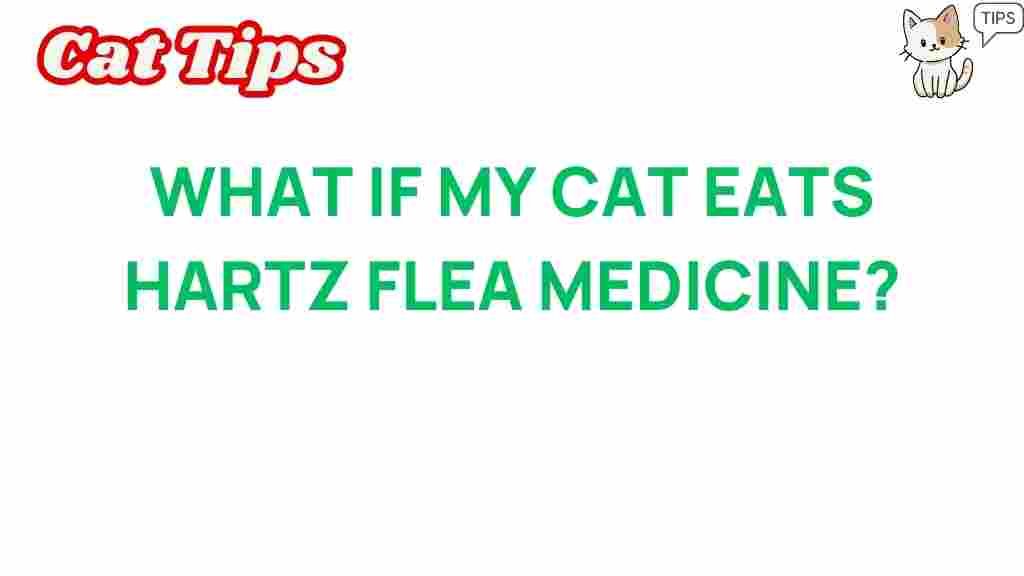What Happens If My Cat Accidentally Consumes Hartz Flea Medicine?
As a responsible pet owner, ensuring the health and safety of your furry friend is always a priority. However, accidents can happen, and if you find yourself in a situation where your cat has accidentally consumed Hartz flea medicine, it’s essential to know what steps to take. This article will guide you through the potential risks, symptoms to watch for, and how to respond effectively.
Understanding Hartz Flea Medicine
Hartz flea medicine is a popular choice among pet owners for controlling fleas and ticks on cats and dogs. While effective, it contains active ingredients that can be harmful if ingested inappropriately. The medicine often comes in various forms, including topical treatments, collars, and oral medications. It’s crucial to understand that each type may have different implications if consumed by your cat.
Common Ingredients in Hartz Flea Medicine
Before diving into what happens when a cat ingests Hartz flea medicine, let’s take a look at some of the common ingredients:
- Fipronil: A neurotoxin that kills fleas and ticks.
- Imidacloprid: A chemical that disrupts the nervous system of insects.
- Pyriproxyfen: An insect growth regulator that prevents flea eggs from hatching.
- Permethrin: A synthetic chemical similar to pyrethrins, which can be toxic to cats.
Each of these components can lead to various health issues if ingested by a cat, making awareness of the situation crucial.
What to Do If Your Cat Eats Hartz Flea Medicine
If you suspect your cat has consumed Hartz flea medicine, follow these steps:
1. Assess the Situation
First, determine how much of the medication your cat has ingested:
- If your cat has consumed a small amount (like a few drops), monitor their behavior closely.
- If your cat has ingested a large quantity or if it is a topical treatment, act quickly.
2. Observe Your Cat’s Symptoms
Watch for signs of distress or any unusual behavior, including:
- Vomiting
- Diarrhea
- Excessive drooling
- Tremors or seizures
- Lethargy or weakness
- Loss of appetite
Documenting these symptoms can be helpful when speaking to a veterinarian.
3. Contact Your Veterinarian Immediately
Regardless of the amount consumed, it’s always best to consult with a veterinarian. Provide them with:
- The type of Hartz flea medicine consumed
- The amount ingested
- Your cat’s weight and age
- Any symptoms observed
Your vet may recommend bringing your cat in for an examination or provide guidance over the phone.
4. Do Not Induce Vomiting Without Guidance
While it may seem instinctive to induce vomiting, do not do so without your veterinarian’s advice. Some ingredients in flea medication can cause more harm if vomited. Always consult a professional before taking this step.
5. Prepare for the Vet Visit
If your veterinarian recommends a visit, be prepared:
- Bring the original packaging of the Hartz flea medicine for reference.
- Write down any questions you may have regarding treatment.
- Keep your cat calm and secure during transportation.
Potential Risks of Hartz Flea Medicine Ingestion
Ingesting Hartz flea medicine can lead to several health issues, depending on the active ingredients and the amount consumed. Here are some potential risks:
1. Neurological Symptoms
Fipronil and permethrin can affect the nervous system, leading to:
- Seizures
- Tremors
- Muscle spasms
2. Gastrointestinal Distress
Ingesting any flea medication can lead to:
- Vomiting
- Diarrhea
- Loss of appetite
3. Allergic Reactions
Some cats may experience allergic reactions, which can manifest as:
- Swelling of the face or paws
- Difficulty breathing
- Itching or rash
4. Long-term Health Issues
In severe cases or with prolonged exposure, Hartz flea medicine can lead to chronic health issues. Regular monitoring and veterinary check-ups may be necessary.
Troubleshooting Tips for Accidental Ingestion
In the event of accidental ingestion, consider the following troubleshooting tips:
1. Keep Calm
Panic can worsen the situation. Stay calm to think clearly and act quickly.
2. Remove Access to the Product
Ensure that all flea medications are stored securely and out of reach from pets. This includes topical treatments, collars, and any other products.
3. Educate Yourself and Others
Make sure all family members understand the importance of keeping harmful substances away from pets. Share information about Hartz flea medicine and its potential dangers.
4. Consider Alternatives
If your cat is sensitive to certain ingredients, discuss alternative flea treatments with your veterinarian. There are many natural and prescription options available.
Conclusion
Accidental ingestion of Hartz flea medicine can be alarming, but knowing how to respond can make a significant difference. Always err on the side of caution and consult your veterinarian if you suspect your cat has consumed any flea medication. By taking proactive steps and educating yourself about the risks, you can help ensure your feline friend remains safe and healthy.
For more information on pet health and safety, check out this resource.
Additionally, keep an eye on the safety of your home environment by visiting a comprehensive guide on pet-proofing your home here.
This article is in the category Safety and created by CatTips Team
